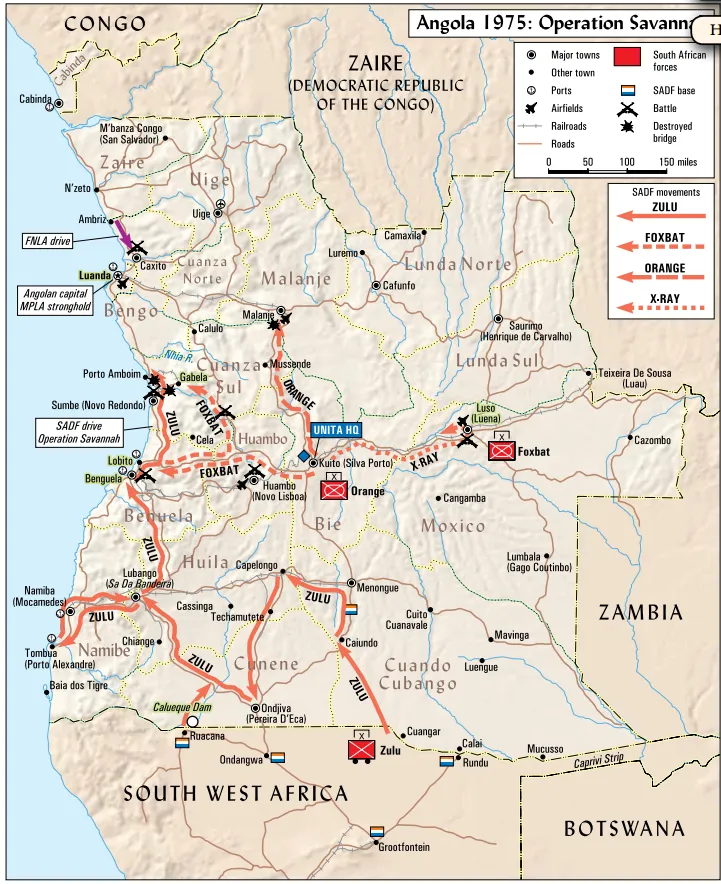As much as fighting group Zulu had been having great success, in their over 3000 km advance to reclaim territory for UNITA, all was not totally well.
In fact the fighting groups were almost becoming victims of their own success.
The South African forces had not been involved in conventional warfare up till this stage. The past decades involvement with PLAN and SWAPO had been mostly counter insurgency operations conducted within their own borders, or relatively close to their own borders.
Any forays further afield had typically been limited to small special forces operations.
Operation savanna was steadily growing with the formation of two more fighting groups X-ray and Orange. Numbers were swelling to close to 3000 men and this excluded the UNITA infantry, in vegetable trucks, accompanying the South African light armored columns.
This was fast turning into something far different from counter insurgency and somewhat resembling a conventional war.
The MPLA and the Cubans were falling back from the far flung areas of the Country to defend the areas closer to the Capital and destroying bridges and setting up defenses at these natural obstacles to slow the South African Advance.
Few of the logistical plans or infrastructure were in place.
This became increasingly more difficult as the SA columns extended deeper and deeper into Angola and further and further from existing lines of supply.
This entire operation had been a spur of the moment thing, brought about by the sudden pull-out of the Portuguese; and necessitated by the possibility of a Soviet backed Independent Angola, that would likely be very supportive of SWAPO and PLAN.
It was hastily put together and not expected to last as long as it did.
Some of the teenage conscripts driving the Armored vehicles for Foxbat later describe how their "couple of weeks adventure" was fast turning into a living hell.
The single set of clothing, in the form of their "secret" prison uniform, was rotting off of their bodies from the rain.
It was the wet season in Angola and as you move further northwards the more subtropical it becomes. Vehicles were constantly becoming bogged down and straying from the road was treacherous.
The stress of frequent encounters or "contact" with the enemy was taking its toll. The indiscriminate shooting at everything that moved and rapid advance was wearing minds down. Malaria was taking its toll.
From the very frequent "contacts" they had and infrequent resupplies they were often low on ammunition. Food was scarce and diarrhea was plentiful, whether due to the local water or the fact that many of the rations were years past their expiry dates.
Battle fatigue and shell shock, (now called Post Traumatic Stress Disorder or PTSD) was claiming its fair share.
The human mind of most individuals is not fit to sit well with butchering fellow humans in spite of what commanding officers say.
Armored car crews were in flux with having to swap out crew members due to many of the above ailments.
It was under these circumstances and with the approaching independence day of the 11th November 1975, that some of the largest of the battles of the entire Operation were fought.
Fidel Castro was uptight, Luanda, the capital was under threat he started poring in more men and machines. Their role switched from training MPLA soldiers and advising to more actively engaging in the fighting.
Among the fresh wave of Cubans were special forces and Cuba was far more adept at conventional warfare than the MPLA guerrillas, as the Advancing South Africans and CIA backed FNLA, were soon to find out...
Other posts in this series
The piece of the cold war nobody told you about - Africa's forgotten war
The Air Battles
The SA Fighter Aircraft
The SA Bomber Aircraft
The conflicts deep roots and start
Regional Tensions
Africa's forgotten cold war - Angolan War of Independence.
Africa's forgotten cold war - Mozambican War of Independence.
Africa's forgotten cold war - Rhodesian Bush War
Africa's forgotten cold war - The Angolan War of Independence transitions to the Angolan Civil War
The South African Border War - The start of Operation Savannah and Large scale South African involvement.
